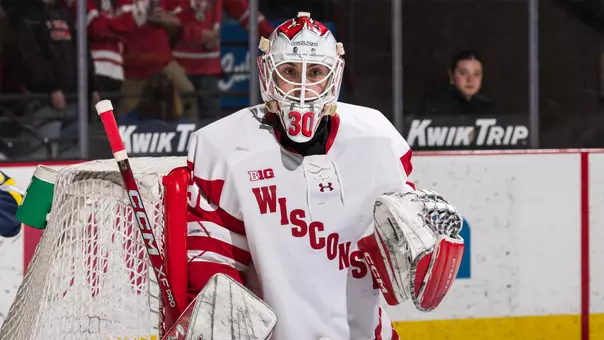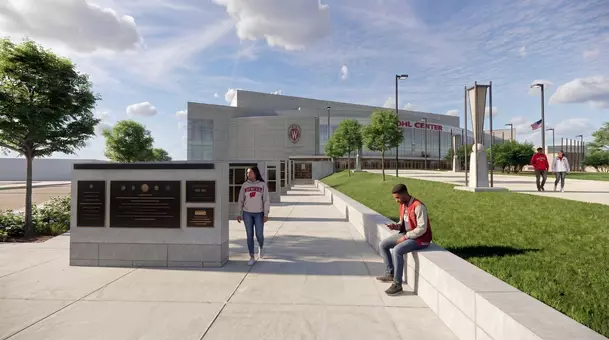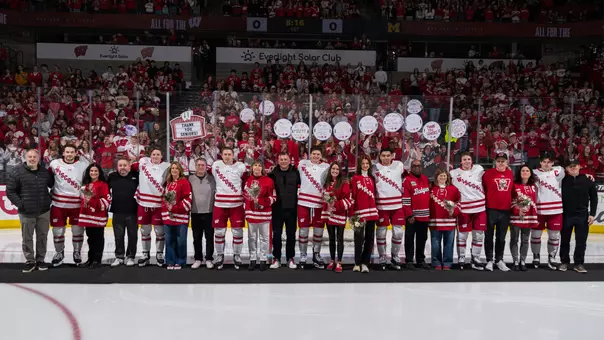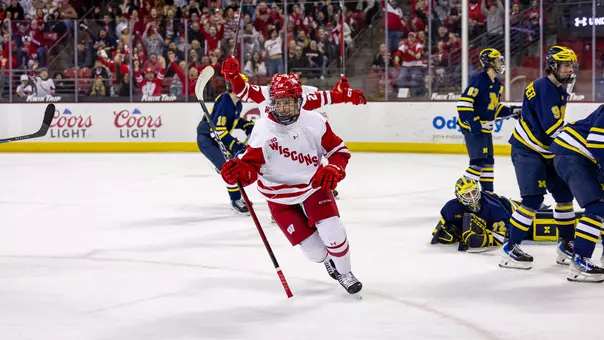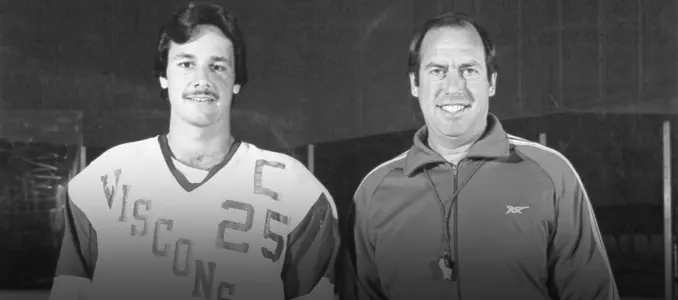
2016 Hall of Fame: Bruce Driver
August 26, 2016 | General News, Men's Hockey, Andy Baggot
Bruce Driver’s leadership paved the way for a golden era of UW hockey
 |
||
|
BY ANDY BAGGOT
UWBadgers.com Insider
From Varsity Magazine
Bruce Driver didn't know it at the time, but a moment of personal anguish when he was 13 would steer him to the Wisconsin Athletic Hall of Fame.
Driver was cut after trying out for his Toronto-area bantam hockey team – evaluators thought he was too small – leaving him "devastated."
A couple years later, Driver was big enough – and good enough – to make the Major Junior club in Oshawa, Ontario, but turned down an invitation to play in one of the premier developmental leagues outside of the NHL.
"I said, 'You know what? It's great. It's an honor to play in a Major Junior A league, but I should really think about focusing on an education because if I don't make it as an NHL player, I need something to fall back on,'" Driver recalled.
So Driver played another year at the Tier II level, drawing the attention of college recruiters. One day, after an 11-4 loss no less, he sat in his living room and heard Wisconsin men's coach Bob Johnson and his top assistant, Grant Standbrook, offer him a full scholarship.
Driver accepted and embarked on one of the most decorated careers in UW history, one that earned him a spot in the latest class of Hall of Fame inductees.
Driver, 54, played in three straight NCAA title games with the Badgers, 1981, '82 and '83, and is one of 10 players in program history to own multiple championship rings (1981, '83).
Driver was a first-team All-American in 1982, was captain of the '83 squad and is one of 11 Badgers defensemen to top 100 points in his career.
That success and production led Driver to be chosen in the NHL draft in 1981 – 108th overall by New Jersey – earned him a spot playing for Team Canada in the 1984 Winter Olympics and paved the way for a 14-year career in the NHL that included a Stanley Cup championship with the Devils in 1995.
"I feel very blessed to have chosen a school that had that much success," Driver said. "It allowed me the chance to be drafted. It also opened up the doors for me to have the chance to play for the Canadian Olympic Team."
"I feel very blessed to have choen a school that had that much success," Driver said. "It allowed me the chance to be drafted. It also opened up the doors for me to have the chance to play for the Canadian Olympic Team."
Driver turned pro after his junior season and said he took summer school classes at UW until the ones he needed for graduation were no longer offered during the summer.
He doesn't have a degree, but the way Driver sees it, he still came away from his time in Madison with a quality education.
"Everything outside of what I've done playing the game, I've taken stuff I learned at school in Wisconsin and applied it," he said.
Driver wears multiple hockey-related hats these days.
He's president of the New Jersey Devils alumni association. He's president, general manager and part-owner of the Twin Oaks Ice Rink in Morristown, New Jersey. He also coaches a boys' midget team and the Morristown-Beard High School girls' team.
"I'm always running," Driver said.
It sounds as though Driver is more immersed in hockey now than he was when he was playing 1,030 NHL games from 1984 to '98.
"Probably more so now, but it's all good," he said. "It's a lot of planning."
Driver is among six UW players who own NCAA and Stanley Cup rings. Joining him are Adam Burish, Chris Chelios, Davis Drewiske, Sean Hill and Dave Maley.
Driver was surrounded by elite players and coaches during his 127-game career at Wisconsin. He played with three fellow Hall of Fame inductees in Behrend (Class of 2006), Chelios ('11) and Theran Welsh ('10). Driver played two seasons for Johnson (1992) and is joined in the current class by Jeff Sauer, who coached the Badgers from 1983 to 2003.
Driver also played with Mike Richter, a 2005 selection, for three NHL seasons with the New York Rangers.
In addition, Driver had the distinction of serving as captain at UW as well as in the NHL with the Devils.
"Certainly anytime you get that honor it's something that you value," he said of wearing the "C'' on his sweater. "But every time I've been put in that situation I was surrounded by great teammates. That was the situation at Wisconsin."
Driver had a front-row seat for one of the most storied periods in Wisconsin hockey history.
"Everything outside of what I've done playing the game, I've taken stuff I learned at school in Wisconsin and applied it," Driver said.
The 1980-81 national title-winners were known as the "Backdoor Badgers" because they were upset in the Western Collegiate Hockey Association playoffs by Colorado College and needed some intense lobbying by Johnson to secure an at-large berth in the NCAA tournament.
Driver said the 1981-82 squad was the most talented of the three he played on at UW – it won 35 of 47 games and came away with the WCHA playoff title – but fell to mega-rival North Dakota in the NCAA championship game.
The 1982-83 club prevailed even though Johnson left for the NHL – he became coach of the Calgary Flames – turning the reins over to Sauer.
"The transition was incredibly seamless," Driver said.
It helped that the Badgers had a steady hand in a leadership role in Driver, who finished his college career with 28 goals, 86 assists and 114 points.
"He didn't talk a lot," Sauer said. "He wasn't one of those rah-rah guys. I didn't have to worry about him off the ice and stuff.
"I can see where he had such a successful career professionally because he was a professional when he was here, both character-wise and hockey-wise. He was just a very steady player for us. He was one of those guys you could really count on in all situations."
Driver said his father, Gord, and older brother, Gary, helped steer him in the right directions. Gary played hockey and Gord coached in Toronto while working full-time in a Goodyear Tire factory for 45 years.
"I learned a lot of valuable lessons from both of them," Bruce said.
Driver and his wife, Tracy, have two grown children – Whitney and Dillon – and two grandchildren.
The call informing Driver of his induction was jarring.
"I was surprised, certainly," he said. "A great honor."
Driver said he still keeps tabs on the Badgers and college hockey in part because he works with kids who aspire to play at that level.
Looking back, Driver said he didn't know a lot about Wisconsin when he was being recruited, but he cherishes the memories he made.
"It was a pretty easy decision," Driver said.
A good one, too.

